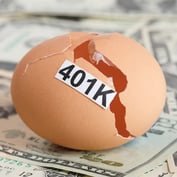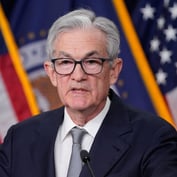(Bloomberg) — U.S. stocks were little changed after capping the best week since July, while gold and wheat fell. The ruble declined after a deadly clash in Ukraine and the yen slid as Japan’s trade deficit widened more than forecast.
The Standard & Poor’s 500 Index advanced less than 0.1 percent to 1,865.44 at 9:32 a.m. in New York, following a 2.7 percent gain last week. Ten-year Treasury yields fell two basis points to 2.70 percent. Gold slid to a two-week low and wheat dropped 2.2 percent. The ruble depreciated 0.3 percent against the dollar. Japan’s currency declined versus all of its 16 major peers. Markets in the U.K., Germany, Hong Kong and Australia were closed for the Easter Monday holiday.
Stocks advanced last week in the U.S. after Federal Reserve Chair Janet Yellen reiterated the bank’s commitment to achieving its goals for employment and inflation and earnings from General Electric Co. and Morgan Stanley beat estimates. Netflix Inc. reports results today and the Conference Board releases its gauge of leading indicators. Ukraine warned that Russia may use the fatal shootout in the country’s east as a pretext for invasion as a diplomatic accord reached last week showed little sign of taking hold.
“I suspect most companies are going to raise guidance for the upcoming quarters,” said Patrick Spencer, who helps oversee more than $100 billion as head of equity sales at Robert W. Baird & Co. in London. “The economy remains in a sweet spot. I’m very optimistic for this year.”
Economic outlook
The Conference Board’s gauge of the outlook for the next three to six months probably climbed 0.7 percent last month after rising 0.5 percent in February, according to the median of 37 estimates in a Bloomberg survey of economists.
The ruble slipped 0.3 percent against the euro, while Russia’s Micex Index swung between gains and losses after declining as much as 0.9 percent.
Russia’s Foreign Ministry blamed the Ukrainian nationalist group Pravyi Sektor for the violence which left at least three people dead over the weekend, an allegation that Pravyi Sektor denied in a statement. Viktoria Syumar, first deputy head of the National Security and Defense Council in Kiev, said on her Facebook page that Russia’s accusation and statements show it’s preparing to invade Ukraine. Geneva accord
The discord adds to skepticism about whether Ukraine, the U.S. and the European Union will be able to use an April 17 Geneva accord to encourage Russian President Vladimir Putin to ease tensions that he says he’s had no role in creating.








 April 21, 2014 at 08:32 AM
April 21, 2014 at 08:32 AM










